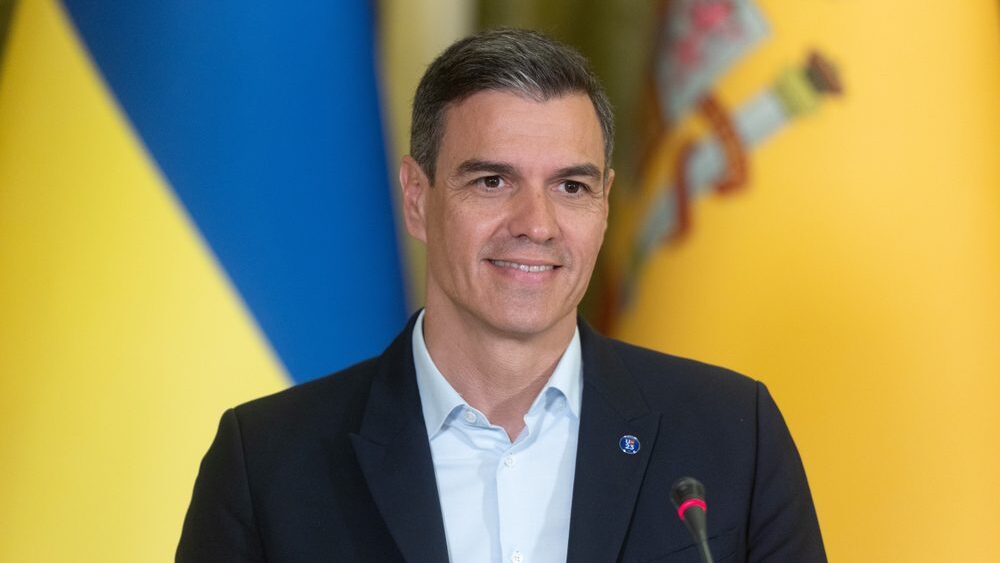
Spanish Prime Minister Pedro Sánchez
Photo: photowalking / Shutterstock.com
Spanish Prime Minister Pedro Sánchez is one in a row of European leaders who have tried recently—in vain—to dissuade Viktor Orbán from his resistance to Ukrainian EU membership as Eurocrats are expected to begin unfreezing funds for Hungary in the hopes of bringing Budapest on board.
The Thursday call between the two leaders came ahead of next week’s EU Council meeting in Brussels, where member states are planning to discuss how to pursue a Ukraine EU membership, a move opposed by Hungary and Slovakia.
Sánchez, who has consistently championed a hawkish position on Ukraine, had hoped to use Spanish control over the EU Council presidency as leverage. Orbán described the exchange as “frank” before adding that there was no European consensus on proceeding with Ukraine’s EU ambitions.
The EU has been accused of hypocrisy for turning a blind eye to Sánchez’ controversial amnesty law that helped him secure an extra term for his ruling socialist party following inconclusive Spanish elections earlier this year.
Critics, mainly from the centre-right European People’s Party (EPP), have accused the EU of staying silent on Sánchez bending the law and risking a national breakup by allying with Catalan separatists, in stark contrast to the Commission’s dogged pursuit of Hungary in recent years over migration, foreign policy, and ‘rule of law’ issues.
Orbán expressed similar stiff opposition to Ukrainian accession during a one-on-one meeting with French President Emmanuel Macron in Paris on Friday, as the Hungarian leader stated that Europe could “risk total chaos” by allowing Ukraine into the bloc without the proper preparation.
It is clear that there will be no solution for the #RussiaUkraineWar on the battlefield. Instead of financing the war, we should finally devote Europe’s resources to making #peace. pic.twitter.com/5ZJe38b1La
— Orbán Viktor (@PM_ViktorOrban) December 4, 2023
In an interview with the French press, Orbán described Ukraine as “one of the most corrupt countries in the world” and hinted that Western Europeans were naive about the state of the country.
Hungary argues that the EU should not make promises it cannot keep on Ukraine and that Brussels should first sign a strategic agreement with Kyiv and wait for the ongoing war with Russia to end before even considering the possibility of EU membership.
Behind the ostensible support for Kyiv, the contentious Ukrainian application is posing a major headache to European leaders with concerns over the impact that Ukrainian EU membership would have on issues such as the Common Agricultural Policy, foreign policy, and reconstruction.
Eyes are on Hungary ahead of Budapest’s upcoming presidency of the European Council. Progressives have already made attempts to sabotage Hungarian influence under the guise of ‘rule of law’ claims and alleged Russian sympathies.
Control over the presidency gives Budapest key leverage in directing the EU’s foreign policy response to Ukraine at a time when military experts have come to the consensus that Kyiv’s much-hyped counteroffensive failed to produce necessary results and the United States is accused of preparing an exit strategy on the conflict, leaving to Europe to potentially foot the bill.
The European Commission and other member states are so desperate for Hungarian approval regarding Ukrainian membership that they are even dangling the offer of unfreezing ten billion euros worth of EU cohesion funding held up in the ‘rule of law’ saga.
Late last month, Charles Michel flew to Budapest to discuss Hungarian concerns over Ukraine, after President Orbán sent him a letter that, among other things, said that “the European Council is not in a position to make key decisions” on security guarantees or additional financial support for Ukraine and the future of the enlargement process unless a “consensus on our future strategy towards Ukraine is found.”
All diplomatic signs point to a heated Council session in Brussels next week when EU leaders will attempt to kickstart accession talks for Ukraine, with next year’s European elections a potential opportunity for anti-war populists to electorally grow.
